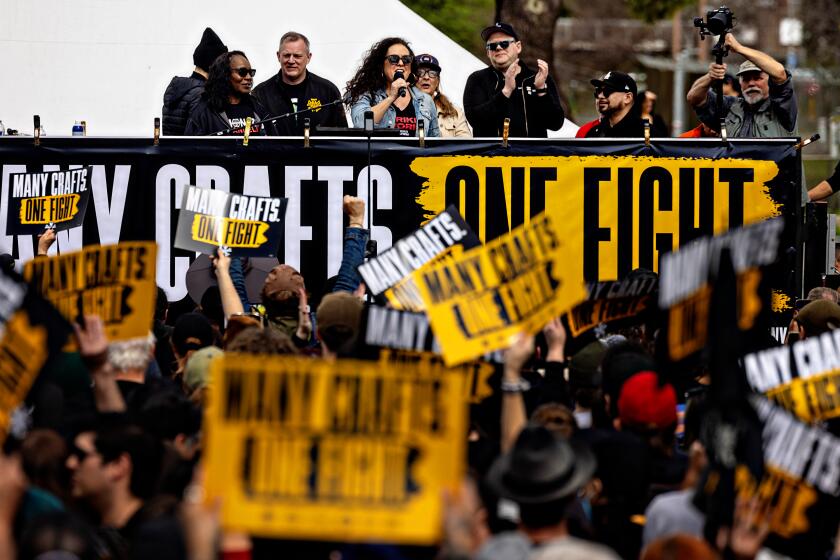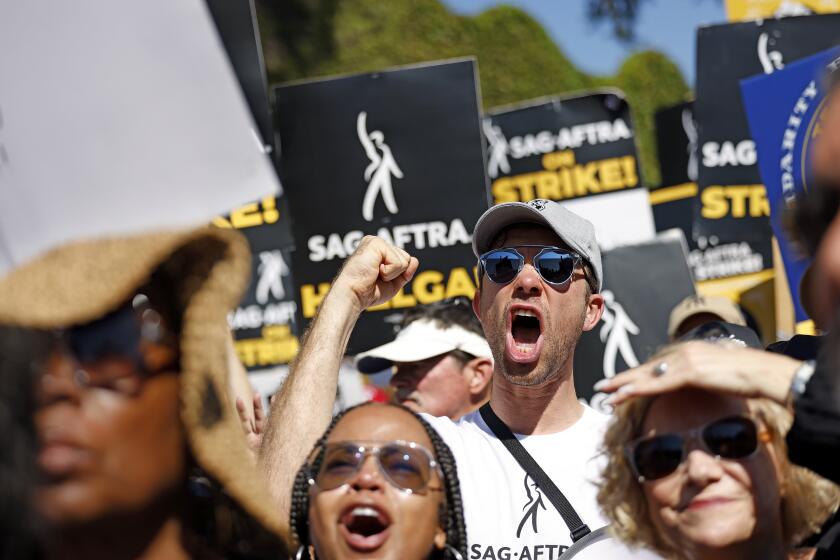Hollywood crew members reach tentative deal with major studios

Film and TV crew members have reached a tentative contract deal with the major Hollywood studios after months of bargaining, the International Alliance of Theatrical Stage Employees and the Alliance of Motion Picture and Television Producers announced Tuesday night.
The resolution arrived before the current contract’s expiration date, finally permitting the entertainment industry to breathe a sigh of relief in the wake of two marathon strikes waged by actors and screenwriters. IATSE’s Hollywood Basic Agreement spans three years and covers some 50,000 craftspeople primarily based in Los Angeles.
The tentative deal includes updated terms related to pay, pension and health benefits, work-life balance, job security, subcontracting, streaming residuals and artificial intelligence.
“From start to finish, your input was invaluable and ensured that our Negotiations Committee was at the bargaining table with clear goals and a consensus for how to achieve them,” IATSE’s negotiating team said Tuesday in a memo to members. “The ratification timeline will be forthcoming and we look forward to presenting to you the complete package.”
A summary of the deal will be released within the next few days, followed by a full copy of the document in roughly two weeks. The deal must then be ratified by the union’s membership before the memorandum of agreement can officially go into effect.
So far, the union has revealed that the deal contains wage-scale increases of 7%, 4%, and 3.5% over the three-year term. It also stipulates that hourly workers are entitled to triple-time pay whenever the workday exceeds 15 hours — an effort by the union to dissuade employers from scheduling marathon shoot days.
Additionally, on-call employees would receive double-time pay on the seventh day of the workweek under the new agreement.
The deal includes terms related to artificial intelligence as well, mandating that “no employee is required to provide AI prompts in any manner that would result in the displacement of any covered employee,” according to Tuesday’s announcement.
IATSE and the AMPTP returned to the bargaining table this week after failing to close the deal during the previous round of general negotiations earlier this month. Last to fall into place were terms related to wages, pensions and health benefits, according to a union source who was not authorized to comment.
The International Alliance of Theatrical Stage Employees (IATSE) is scheduled to enter general contract negotiations with the Hollywood studios this week.
IATSE — which advocates for costume designers, makeup artists, hairstylists, cinematographers, set decorators, lighting technicians, camera operators and other craftspeople — has been campaigning for a new contract since early March. The labor organization’s current pact with the major studios went into effect in 2021 and was set to expire July 31, 2024.
Heading into general negotiations for the Hollywood Basic Agreement, the union was seeking “significant” wage increases to keep up with inflation, higher penalties for rest-period violations, enhanced sick leave and bumps in streaming residuals, as well as regulations around subcontracting and AI. Crew members also demanded funding for their pension and health plans amounting to at least $670 million.
Hollywood’s below-the-line workers concluded general negotiations with the AMPTP about seven months after actors resolved their labor dispute with the entertainment companies.
IATSE and Teamsters, two unions representing Hollywood crew members, are entering contract negotiations with the studios after the writers’ and actors’ strikes.
The overlapping writers’ and actors’ walkouts came as a devastating blow to workers and employers alike. The resulting production shutdown hobbled studios’ release schedules, while countless actors, writers and crew members suffered without work.
Since the strikes lifted, production has been slow to return and numerous entertainment professionals remain unemployed, especially in California, amid a long-brewing industry contraction.
The pullback — largely caused by the companies’ overspending during the streaming wars of the last few years — has manifested in watershed corporate mergers, mass layoffs and shrinking production slates.
If approved by union members, the tentative contract would end a strike that lasted nearly four months and shut down Hollywood film and TV productions.
Thus, IATSE’s contract campaign arrives at a critical moment for the film and TV business. Initially, both workers and studios were wary of the crew members’ negotiations with the AMPTP leading to another potential strike.
IATSE has never gone on strike in its long history. Nonetheless, members and allies prepared for the worst case scenario by donating money, groceries, meals, shared rides, child care, temporary housing and other forms of aid to workers in need.
Before launching its contract campaign, IATSE promised that negotiations would culminate in either a ratification vote or a strike authorization vote.
Workers in film and TV, most of whom are pro-union, have been trying to make ends meet amid a dual strike of Hollywood actors and writers.
But it became increasingly clear that IATSE’s dealings with the AMPTP wouldn’t culminate in a walkout once the first phase of negotiations — separate bargaining sessions tailored to the specific concerns of each of the union’s 13 West Coast studio locals — transpired on schedule without incident.
Fresh off the success of the craft-specific talks, the sentiment between the union and the studios was conciliatory and productive approaching general negotiations.
“It’s civil,” IATSE international President Matthew Loeb told The Times in April as the trade-specific negotiations were wrapping up. “Everybody wants to avoid a strike.”
Ahead of the union’s final push, nearly 400 Hollywood actors, writers, directors and producers signed a letter advocating for crew members. Signatories included Quinta Brunson, Mark Ruffalo, Connie Britton, Ryan Coogler, Amy Schumer, Shaka King, Destin Daniel Cretton, Pamela Adlon, Olivia Wilde, Jonathan Groff, Nick Kroll, Lamorne Morris, Lilly Wachowski, Boots Riley, Gina Prince-Bythewood, Natasha Lyonne, Seth Rogen and Kerry Washington.
The letter urged the AMPTP to land on “a fair contract that acknowledges [crew members’] essential contributions to production and allows these behind-the-scenes artists, artisans, and craftspeople to live and retire with dignity.”
“These crewmembers dedicate their lives to their artistry and to their departments — working long hours in often challenging conditions to bring stories to life,” the letter continued.
Teamsters Local 399 — which represents drivers, mechanics, warehouse workers, animal handlers and other tradespeople on film and TV sets — is also pursuing a new contract and has yet to secure a tentative agreement with the AMPTP.















